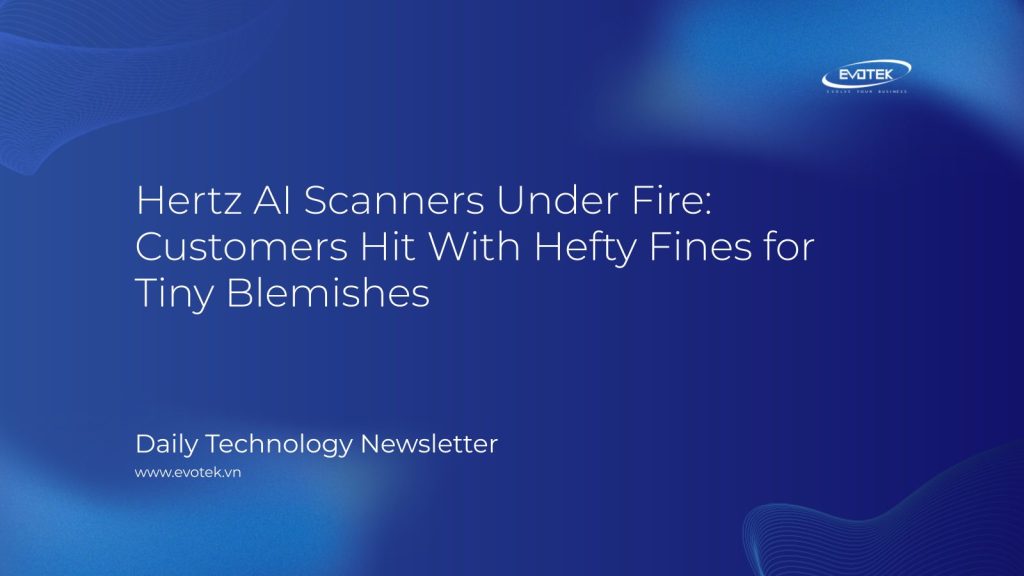A growing number of Hertz customers are discovering a significant downside to the rental giant’s adoption of AI-powered vehicle scanners: charges for minuscule imperfections that many might consider normal wear and tear. This trend, highlighted by recent customer experiences, is raising questions about fairness and transparency in vehicle inspections.
Just weeks after a report surfaced about a Hertz customer in Atlanta being charged $440 for a minor wheel scratch detected by an AI system, similar accounts are emerging. One particularly striking case involves Adam Foley, who publicly shared his ordeal on LinkedIn. Hours after returning his rental, Foley received a notification from Hertz’s AI system flagging two small areas of “damage” of similar size.
One imperfection was on the car’s roof, and the other on the driver’s side front fender. Foley’s shared image of the fender damage revealed a barely perceptible mark, seemingly smaller than a dime in diameter and not deep. Despite its trivial nature, Hertz charged him a total of $350 – encompassing $80 for each alleged dent and an additional $190 in processing and administration fees.
Aggressive Collections and Elusive Support
Consistent with previous reports, Hertz and UVeye, the company behind the AI scanners, appear to prioritize swift payment. Foley was offered a $65 discount if he paid the full amount immediately. Customers attempting to contest or discuss these charges face significant hurdles. The web portal designed for viewing and paying for damages offers no direct link to human support. Instead, customers are directed to a separate support line, a detail not clearly communicated.
Foley recounted his frustrating attempt to dispute the charges through an automated AI chat, stating, “To protest this fee, it is an automated AI chat experience that does not break to go to a human interaction no matter what choices you make. You are only given explanations for why you still owe $190.”
For Foley, this experience was enough to deter him from renting with Hertz again under the current policy. The irony lies in the fact that many consumers might appreciate AI-driven inspections for their speed and visual evidence, provided the process was more reasonable.
Transparency vs. Disproportionate Charges
Hertz has previously asserted that their goal is to “enhance the rental experience by bringing greater transparency, precision, and speed to the process” when damage occurs, noting that “the vast majority of rentals are incident-free.” While transparency and speed are commendable, the central issue revolves around the *type* of flaws the AI is flagging and the disproportionate charges that follow.
A minor ding like the one on Foley’s fender could easily be overlooked by a human inspector, and it’s highly unlikely to register with a subsequent renter. Such trivial marks are also not the kind of damage the average car owner would immediately seek professional repair for. These imperfections often represent the natural, inconsequential wear and tear that occurs when a vehicle is used by hundreds of drivers over time – perhaps from gravel kicked up on the highway or a minor parking lot mishap.
The question then becomes: why is Hertz charging for them? The most probable answer appears to be a simple calculation of opportunity. As Foley himself observed, the core concept of using AI and cameras to assess damages holds merit. “It makes sense,” he wrote. However, he critically added, “What does not make sense is the granularity they have resorted to by going down to negligible ‘damages’ and created a human-less system.”
He speculates that the substantial investment in such advanced technology may have compelled Hertz to adopt “extortive levels” of charging to achieve a quick return on investment. While the cost of UVeye’s technology to Hertz remains undisclosed, the current strategy suggests that AI-scanned rentals don’t need higher upfront rates. Instead, they can generate revenue by meticulously identifying and charging for every minuscule flaw, regardless of whether Hertz intends to repair the “damage.” And for these powerful scanners, finding something very small is evidently not difficult at all.

 日本語
日本語 한국어
한국어 Tiếng Việt
Tiếng Việt 简体中文
简体中文